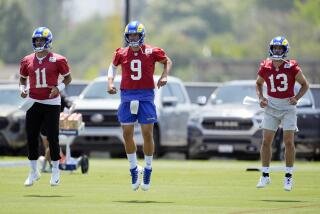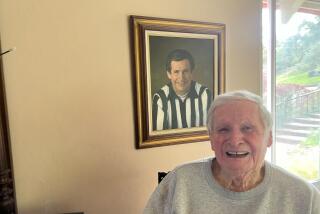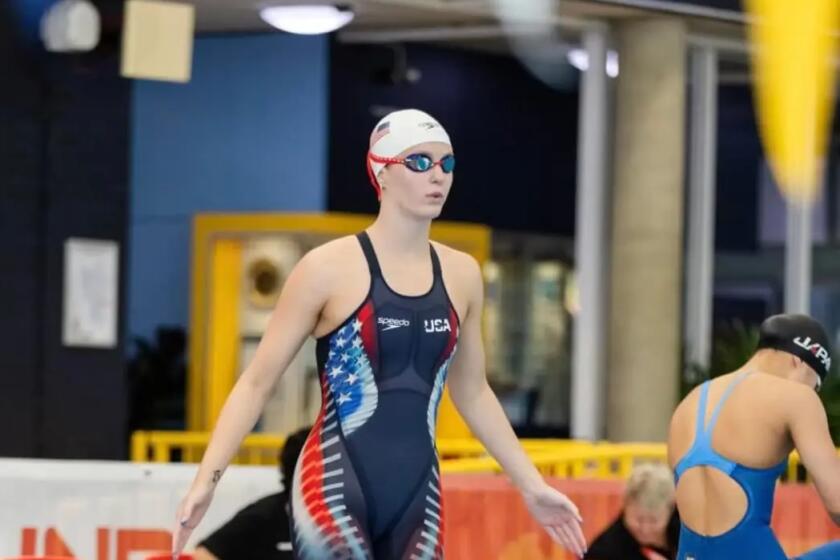BACK FROM DISGRACE : Cornerback Reggie Sutton Has Made a Lot of Mistakes, but Now He’s a Saint
- Share via
Now you see Reggie Sutton: Boston College vs. Miami at the Orange Bowl. National television. Doug Flutie lets loose with the Hail Mary pass. Sutton and a cast of Miami thousands mis-time their jumps. Touchdown. Miami loses.
Now you don’t: Sutton, once described by coaches as the team’s best athlete, is dismissed from school shortly after Miami’s loss to UCLA in the 1985 Fiesta Bowl. Poor grades are the official reason. Rumors of drug use are the unofficial explanation.
From there, it’s an eight-month free fall to reality, complete with a bout of severe marijuana dependency, a desperate stint as a hospital worker, a legal battle to gain eligibility for the 1986 National Football League draft and a lonely stay at a drug rehabilitation center.
And for what?
“Oct. 9, 1986,” Sutton said. “I remember that. That’s the day I signed with the Saints.”
So now you see him again: New Orleans cornerback. Tied for the conference lead with four interceptions. Three blocked punts, one returned for a touchdown--against the Rams. Budding family man. At last check, clean as a whistle.
After an extended absence from the good life, Sutton has chosen to return. All it took was enough heartache to line a football field, enough mistakes to jeopardize a promising career.
“I think I’ve been pretty lucky to this point,” Sutton said.
This from the man who left Miami in a quick burst of disgrace. The closest thing he had to a degree was a thermometer. And junior college was out of the question. “No money,” he said.
What was supposed to have been a pleasant stay at Miami, a chance to play in front of the hometown folks, became a weekly struggle. Sutton decided he wasn’t there to crack books, but wide receivers. Classes, he determined, would be optional. Studying an afterthought.
So he flunked. Besides playing cornerback, it’s what he did best at Miami.
“When you first get kicked out, you say things like, ‘Coach didn’t like me,’ or, ‘Jimmy Johnson had things against me,’ ” Sutton said. “Now, when I look back, I see it wasn’t his fault, at all. It was my own, not going to class. I don’t fault nobody.”
According to National Collegiate Athletic Assn. rules, Sutton had another year of eligibility remaining. Broke and not exactly lugging an impressive academic record, he decided he would try to turn professional, in time for the NFL scouts’ tryouts. As he waited for his petition to be decided upon, Sutton said he used the same discretion that got him punted, passed and kicked out of Miami in the first place. He messed up.
“What happened when I got thrown out of school is that I didn’t have nowhere to turn,” he said. “Football was my life. I had football for 13 years. All of the sudden, I’m not able to play anymore.
“I started hanging out with the wrong crowd. I got addicted (to marijuana). I just kept doing it and doing it. I didn’t have nothing else to do. I kept smoking it.”
For money, Sutton worked at a local hospital as a patient escort. The pay was minimal, the work depressing.
“I took the patients to surgery, stuff like that,” he said. “When they got out of surgery, I’d take them back. It wasn’t fun, at all. So many sick people. It was nasty work. I didn’t like to do it, but I had to work.”
The Saints knew about Sutton, the player, that is. Despite his size--a smallish 5 feet 10 inches, 180 pounds--Sutton was quick and sure of himself on the field.
“An exceptional athlete,” said Jim Finks, the Saints’ general manager. “We saw films of him as a junior. And (then-Miami Coach Howard) Schnellenberger made a statement that Reggie was one of the best athletes on the team.”
But by the time the NFL approved Sutton’s petition, the scouting combine meeting had been held in New Orleans. So, Sutton made the rounds, auditioning for stopwatches wherever and whenever he could.
On draft day, the Saints, fully aware of his drug use, selected Sutton in the fifth round.
“We were told that everything was OK,” Finks said. “We found out it wasn’t OK after we had drafted him.”
Sutton tested positive for drugs. When confronted by the Saints, Sutton denied the results. “I just told them I didn’t have a problem with it,” he said.
He was tested again. Same results.
The Saints later put Sutton on a non-football-related reserve list, where he stayed from the moment he was signed. He was given a choice: drug rehabilitation or a release from the team. He chose the drug program. For this, Sutton is grateful.
“The Saints stuck with me 100%,” he said. “They never gave up on me. They gave me a lot of support. I mean, I went through a rehab program, and they made me see some good. When you’re in a program, you start to feel sorry for yourself. It’s like, nobody wants to touch you because you have a problem. But (the Saints) didn’t. That inspired me to work harder. I think they had a lot to do with me wanting to be successful.”
Finks said: “Our feeling is that it’s an ongoing process, as far as the counseling is concerned. The key is to keep his past problem in front of him all the time. I feel good about his future, but I think you’ve got to walk on eggs. You’ve got to be very careful, very supportive and very firm. We talk about overcoming things, but all (his problems) were self-created. We spend so much time compromising on things like this, but he’s making progress.”
About three times a week, Sutton attends anti-drug meetings. He talks about his experiences. He listens to others share their stories. Sort of a verbal therapy. “It helps me,” he said.
As if Sutton needed more obstacles, there was the recent player strike. Sutton sat out one week, then crossed the Saint picket line.
“I’m married, got a wife and a daughter,” he said. “I’m not making a hell of a lot of money. I’ve got to pay bills. I would have lost credit, would have lost my car, would have been late paying the rent.”
No regrets, that’s the new Sutton’s theme. This year, he finds himself with a job and a fresh start. Next year, he says he’s hoping for a starting position.
But this will do quite nicely for now, he says. After all, it beats free falls.
Ram Notes
Ram guard Dennis Harrah was given a cortisone injection Friday to relieve swelling around a bulging disk in his lower back. The injury forced the 34-year-old Harrah out of last week’s game, and he is expected to miss at least two more. . . . Linebacker Kevin Greene, who has missed all but one game this season because of injury and illness, was given more tests Friday. According to trainer Jim Anderson, Greene’s blood platelet level is down again. Platelets, Anderson said, are blood components that aid in clotting. If Greene’s level remains stable, he will be cleared to play in Sunday’s game against the New Orleans Saints at Anaheim Stadium. . . . The Rams have placed Harrah, Shawn Miller (ankle), Norwood Vann (hip), Jon Francis and John Embree on this week’s inactive list. The team has recalled from injured reserve 12th-round draft pick Fred Stokes, a defensive lineman.
More to Read
Go beyond the scoreboard
Get the latest on L.A.'s teams in the daily Sports Report newsletter.
You may occasionally receive promotional content from the Los Angeles Times.










